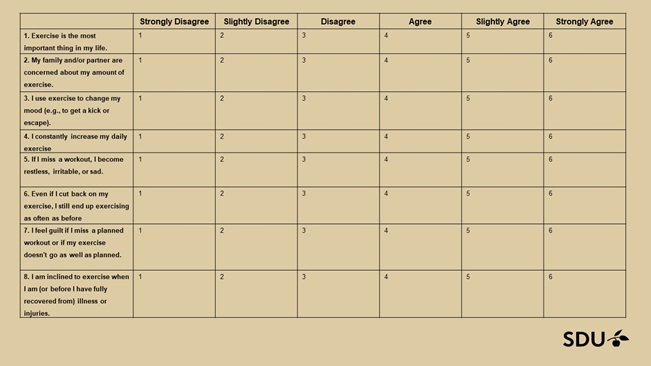
Are you exercise-dependent? A new test provides you with answers!
Has exercising taken over to such an extent that you might be "addicted" to it? With a relatively simple questionnaire, you can find out.
According to her, you should consider your exercise volume and potentially seek help if you can recognize yourself in the statements below.
- Are you constantly increasing your training?
- Do you use exercise to regulate your mood?
- Do you feel guilt if your training doesn't go as planned?
- Do you exercise despite illness and injuries?
If you can answer yes to just some of these questions, it would be beneficial for you to take the test further down in the article to find out if you have symptoms of exercise addiction.
If your answer is yes to even a few of these questions, it would be advantageous for you to proceed to the test further down in the article to determine whether you exhibit symptoms of exercise addiction.
A new and improved test for screening exercise addiction
The test is a product of an international study that has further developed and tested a new and improved questionnaire. The questionnaire that has been most used in studies worldwide up until now dates back to the 2000s.The old questionnaire exhibits certain shortcomings, as it neglects to address essential symptoms of exercise addiction, such as “feelings of guilt when missing a workout” and “persisting with exercise despite injuries”.
- By adding two questions and a new response category, the test has been updated - and now it has also been tested in multiple languages. The new version of the questionnaire encompasses various aspects of exercise addiction, making us better at identifying it, says psychologist and professor at the University of Southern Denmark, Mia Beck Lichtenstein, who has been involved in developing the test.
Exercise addiction can present serious challenges
Mia Beck Lichtenstein and the other researchers involved hope that the new questionnaire can create consensus within research environments focusing on exercise and exercise addiction on how to identify a potential problem.- Exercise addiction is typically observed in 3-10% of various sports, but the numbers vary because different questionnaires have been used and different forms of exercise have been studied. In our Danish studies, the prevalence is 5-8% among both recreational exercisers and elite athletes. With the new questionnaire, we have a solid tool that can be used across languages and cultures, explains Mia Beck Lichtenstein.
- Research shows that exercise addiction increases the risk of injuries, overtraining, loneliness, as well as a rigid and one-sided life where the entire identity and self-worth are tied to the body and exercise. We need to address this by establishing a healthy balance in exercise, where there is also room for rest days, friends, family, hobbies, and other values besides having a well-trained body.
Meet the researcher
Mia Beck Lichtenstein is a professor of digital psychiatry at the University of Southern Denmark.
The Test: Are You Exercise Dependent?
Place a checkmark for each statement. If your total score is 34 or higher, there is a risk that you are dependent on exercise.
NOTE: Remember, this test is only indicative.
Exercise addiction is not a diagnosis, and it is therefore difficult to determine exactly when your exercise has become an addiction.However, if you have a very high score (34 or higher), it is likely that your approach to exercise may have negative consequences for your health.
Place a checkmark for each statement. If your total score is 34 or higher, there is a risk that you are dependent on exercise.
Is your score high?
If your questionnaire score is high, Mia Beck Lichtenstein suggests gradually reducing your training and replacing it with other activities.
It is important to be curious about the underlying reasons for your exercise behavior and consider seeking professional help, such as from a sports psychologist, if your training is becoming uncontrollable.
Frequently, there are psychological issues at play, where exercise becomes a tool to numb or escape from challenging emotions and relationships.
